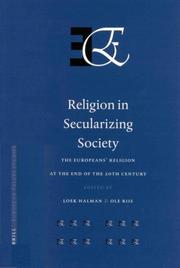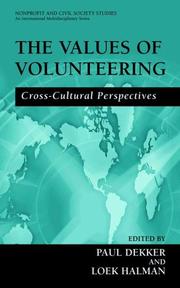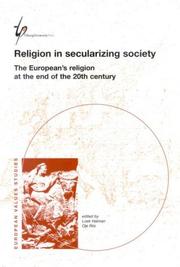| Listing 1 - 10 of 25 | << page >> |
Sort by
|

ISBN: 9789004157781 9004157786 9786613060426 9047429397 1283060426 9789047429395 Year: 2008 Volume: 11 Publisher: Leiden ; Boston : Brill,
Abstract | Keywords | Export | Availability | Bookmark
 Loading...
Loading...Choose an application
- Reference Manager
- EndNote
- RefWorks (Direct export to RefWorks)
This book presents the trends in beliefs and values of people in 85 countries around the world from 1981 to 2004. Based on survey data collected in 1981-1984 and 1989-1993 by the European Values Study, the 1995-1997 World Values Surveys and the 1999-2004 European Values Study and World Values Surveys, it examines trends in human values concerning economics, politics, religion, family, gender roles, civic engagement and ethical concerns and important contemporary issues such as the environment, technology, identity, life satisfaction and human happiness. It is a valuable tool for understanding the cultural patterns of countries and how human values are changing. It will be useful to social scientists, journalists, business executives, politicians and policy-makers working in an increasingly globalized world.
Values. --- 316:2 <4> --- Axiology --- Worth --- Aesthetics --- Knowledge, Theory of --- Metaphysics --- Psychology --- Ethics --- Godsdienstsociologie--Europa --- 316:2 <4> Godsdienstsociologie--Europa --- Values
Book
ISBN: 9036195640 9789036195645 Year: 1991 Publisher: Tilburg Tilburg university press
Abstract | Keywords | Export | Availability | Bookmark
 Loading...
Loading...Choose an application
- Reference Manager
- EndNote
- RefWorks (Direct export to RefWorks)
summary p. 370-374
Values. --- 165.76 --- Values --- 165.4 --- 304 --- Axiology --- Worth --- Aesthetics --- Knowledge, Theory of --- Metaphysics --- Psychology --- Ethics --- Postmodernisme. Poststructuralisme. Post-modernisme. Post-structuralisme --- oordeel --- maatschappij - sociale problemen --- 165.76 Postmodernisme. Poststructuralisme. Post-modernisme. Post-structuralisme
Book
ISBN: 9004665684 Year: 1996 Publisher: Leiden, Netherlands : BRILL,
Abstract | Keywords | Export | Availability | Bookmark
 Loading...
Loading...Choose an application
- Reference Manager
- EndNote
- RefWorks (Direct export to RefWorks)

ISBN: 9036195136 Year: 1988 Publisher: Tilburg Tilburg University Press
Abstract | Keywords | Export | Availability | Bookmark
 Loading...
Loading...Choose an application
- Reference Manager
- EndNote
- RefWorks (Direct export to RefWorks)
Sociology of culture --- 316.752 --- 316.75 --- #SBIB:316.7C120 --- Culture --- Civilization, Modern --- -Values --- Axiology --- Worth --- Aesthetics --- Knowledge, Theory of --- Metaphysics --- Psychology --- Ethics --- Modern civilization --- Modernity --- Civilization --- Renaissance --- Cultural sociology --- Waarden --(sociologie) --- Kennissociologie. Ideologie --- Cultuursociologie: algemene en theoretische werken --- History --- Social aspects --- 316.75 Kennissociologie. Ideologie --- 316.752 Waarden --(sociologie) --- Values --- Popular culture --- Twentieth century --- Culture.
Book
ISBN: 9036199050 Year: 1994 Publisher: Tilburg Tilburg University Press
Abstract | Keywords | Export | Availability | Bookmark
 Loading...
Loading...Choose an application
- Reference Manager
- EndNote
- RefWorks (Direct export to RefWorks)
Sociology of culture --- Netherlands --- Consumer behavior --- Consumption (Economics) --- Sociale agogiek --- Social aspects --- handboeken en inleidingen --- #SBIB:316.7C122 --- Cultuursociologie: overtuigingen, waarden en houdingen --- handboeken en inleidingen. --- Handboeken en inleidingen.

ISBN: 9036197171 9789036197175 Year: 1996 Publisher: Tilburg Tilburg University Press
Abstract | Keywords | Export | Availability | Bookmark
 Loading...
Loading...Choose an application
- Reference Manager
- EndNote
- RefWorks (Direct export to RefWorks)
Social values --- Political culture --- Cross-cultural studies --- -Social values --- -#SBIB:324H30 --- #SBIB:324H50 --- Values --- Culture --- Political science --- Politieke cultuur --- Politieke participatie en legitimiteit (referenda, directe democratie, publieke opinie...) --- Cross-cultural studies. --- #SBIB:324H30 --- Social values - Cross-cultural studies --- Political culture - Cross-cultural studies

ISBN: 9004126228 9004496351 9789004126220 9789004496354 Year: 2003 Volume: 5 Publisher: Leiden; Boston : BRILL
Abstract | Keywords | Export | Availability | Bookmark
 Loading...
Loading...Choose an application
- Reference Manager
- EndNote
- RefWorks (Direct export to RefWorks)
The cross-national analyses of Europe's patterns of religious and moral orientations presented in this book are all based on the 1990 European Values Study survey data and some use both 1981 and 1990 data. Use is also made of more recent data gathered in 1995/1997 within the framework of the World Values Study, directed by Ron Inglehart, as well as data from a recent pilot survey in Japan. The contributions in this book are not written within a common theoretical framework, but from different theoretical perspectives and scientific backgrounds and interests. However, a majority of the chapters focus on the Catholic and Protestant divide in Europe. All in all, the contributions in this book show (parts) of the religious and moral culture in contemporary secularizing societies.
Religion --- History --- Religion - History - 20th century. --- Secularism --- Social values --- Europe

ISBN: 0306478544 1461501458 0306477378 Year: 2003 Publisher: New York, N.Y. Kluwer
Abstract | Keywords | Export | Availability | Bookmark
 Loading...
Loading...Choose an application
- Reference Manager
- EndNote
- RefWorks (Direct export to RefWorks)
Volunteering is one of those phenomena which, despite the limited number of people actually involved in it, is seen as highly important for the proper functioning of society. In fact, volunteering and active participation in voluntary associations are considered to be key components of civil society; it is felt that they generate social cohesion and societal self-regulation as well as strengthening political democracy by developing individual citizenship and organizing countervailing powers. Issues such as these have gained momentum in recent years, especially since Putnam's publications in the 1990s on civic community and democracy in Italy and on the decline of social capital in the United States. However, interest in these issues in fact dates back to the time of the Civic Culture project carried out in the 1950s and 1960s by Almond and Verba, and even much earlier to Tocqueville's famous study Democracy in America in the 1830s. All of these studies, and many more, stress the importance of voluntary civic engagement for the development and maintenance of civilized societal cohesion and political democracy. This research tradition addresses volunteering as just one form of voluntary social and political involvement that might well be linked with other forms, such as passive and active membership of voluntary associations, incidental political activism, or individual involvement in public discourse. However, most studies on volunteering are written in another tradition that is more specifically directed toward direct helping behavior, service delivery, and unpaid work.
316.752 --- Voluntarism --- #SBIB:316.8H30 --- #SBIB:316.7C122 --- #SBIB:044.AANKOOP --- Voluntary action --- Volunteer work --- Volunteering --- Volunteerism --- National service --- Associations, institutions, etc. --- Waarden --(sociologie) --- Professies en methoden in het welzijnswerk: sociaal werk, vrijwilligerswerk, hulpverleningsmethoden … --- Cultuursociologie: overtuigingen, waarden en houdingen --- 316.752 Waarden --(sociologie) --- Sociology of culture --- Sociology of social care --- Sociology. --- Management. --- Social work. --- Sociology, general. --- Social Work. --- Benevolent institutions --- Philanthropy --- Relief stations (for the poor) --- Social service agencies --- Social welfare --- Social work --- Human services --- Administration --- Industrial relations --- Organization --- Social theory --- Social sciences

ISBN: 9036197406 Year: 1999 Publisher: Tilburg Tilburg University Press
Abstract | Keywords | Export | Availability | Bookmark
 Loading...
Loading...Choose an application
- Reference Manager
- EndNote
- RefWorks (Direct export to RefWorks)
#SBIB:001.GIFTSOC --- #SBIB:011.GIFTSOC --- #SBIB:316.331H600 --- 316:2 <4> --- 316:2 <4> Godsdienstsociologie--Europa --- Godsdienstsociologie--Europa --- Secularisatie: algemeen --- Sociology of religion --- Europe
Book
ISBN: 9789004473362 9789004114111 Year: 1999 Publisher: Leiden; Boston : BRILL
Abstract | Keywords | Export | Availability | Bookmark
 Loading...
Loading...Choose an application
- Reference Manager
- EndNote
- RefWorks (Direct export to RefWorks)
The comparative method is at the core of sociological inquiry and gained new importance, emphasis and practitioners particularly after the second world war as a consequence of a large variety of international and global scale developments. The contributions to this book regard nations or countries as contextual units of analysis and treat them as variables. Theoretical explanations are presented of how social phenomena are systematically related to characteristics of the nation states and these explanations are tested empirically using the qualitative tools of mainstream sociology. The chapters in this book can be useful to a broad audience and a range of social scientists who are interested in the understanding of contemporary social phenomena that are no longer limited to national borders but that are transnational or of a global order. Contributors are Toril Aalberg, Wil Arts, Carole B. Burgoyne, Loek Halman, Piet Hermkens, Guillermina Jasso, Mebs Kanji, James R. Kluegel, Ola Listhaug, David S. Mason, Petr Matěju, Neil Nevitte, Thorleif Pettersson, David A. Routh, Svetlana Sidorenko-Stephenson, Johan Verweij, Bernd Wegener, and Peter Van Wijck.
| Listing 1 - 10 of 25 | << page >> |
Sort by
|

 Search
Search Feedback
Feedback About UniCat
About UniCat  Help
Help News
News